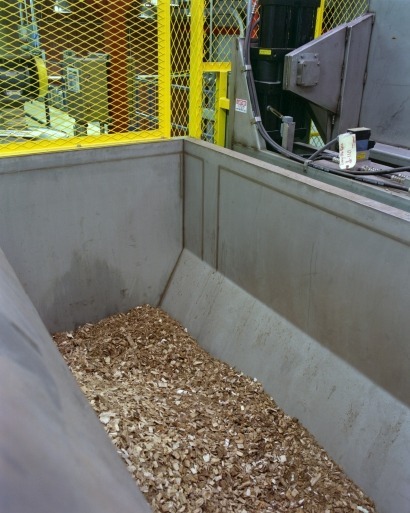
The Energy and Resources Institute (TERI), a global independent research organisation with its headquarters in Delhi, India, has inaugurated a biomass-based village electrification and cold storage project in the Indian district of Sitapur. The project, situated in Bileria village, Sitapur, was inaugurated by Dr. Farooq Abdullah, the Indian Minister of New and Renewable Energy and Dr R K Pachauri, Director General of TERI.
The system incorporates a 50KW advanced biomass gasifier power generation system along with a cold storage capacity of 15MT, an advanced pre-paid metering system and numerous safety features. The system was designed and commissioned by TERI and will be operated by the village community. It will generate enough power to provide 140 households, spread over two villages, with 100W of energy per household. There will also be power monitoring and smart metering at generation and load centres with differential prepaid electricity billing for all customers. The system will also power movement actuated LED street lighting with efficient features and dimming controls and cover productive loads for irrigation systems, flour mills and battery charging.
Since the cold storage can be cooled to a temperature as low as 0 degrees C, a wide variety of fruit, vegetables and horticultural produce can also be stored. The electricity generated by the system is enough to power domestic, community and productive loads in a typical village. The system is the first field level prototype in India and its development has been supported by AusAID in Partnership with the Australian Commonwealth Scientific and Industrial Research Organization CSIRO.
“In several parts of the country farmers receive low prices for perishable produce because they cannot store it and are compelled to sell it when there is a glut in the market” said Dr Pachauri, delivering the keynote address. “Cold chains and cold storage facilities are essential to correct this problem and for providing farmers a fair and decent return for their hard work and sustained efforts. With the opportunities that renewable energy technologies provide, TERI in partnership with the Australian Commonwealth Scientific and Industrial Research Organization (CSIRO) has developed a design for refrigeration using decentralized production of energy based on agricultural residues. This technology once scaled up across the length and breadth of India will bring about a revolutionary improvement in the economic condition of farmers in this country.”
TERI started work on the project in 2006 in order to enable indigenous biomass resources to be used for the operation of small, decentralized cold storage systems in rural villages. In addition to the provision of cold storage facilities to farmers it was envisaged that these systems would also supply grid-quality power to the village thereby offering a holistic solution to some of the key problems facing agriculture in India. Dr Abdullah said during the ceremony that while India is lagging behind in the energy sector, there is no reason why this could not be changed if everyone in the country works together. He added that his ministry would certainly provide all the help needed to establish other such energy systems.
“In developing countries like India use of biomass and other renewable energy resources to address twin challenges of village electrification and decentralized cold storages could help revolutionize the rural economy" said Dr Amit Kumar, TERI’s Director of Energy, Energy and Technology Development.
TERI expect that the successful deployment of the system will open up opportunities for other such systems throughout India. A report recently commissioned by the Planning Commission of India concluded that there is a requirement for building small-scale cold storages near fields although poor power supply remains a challenge.
For additional information:

